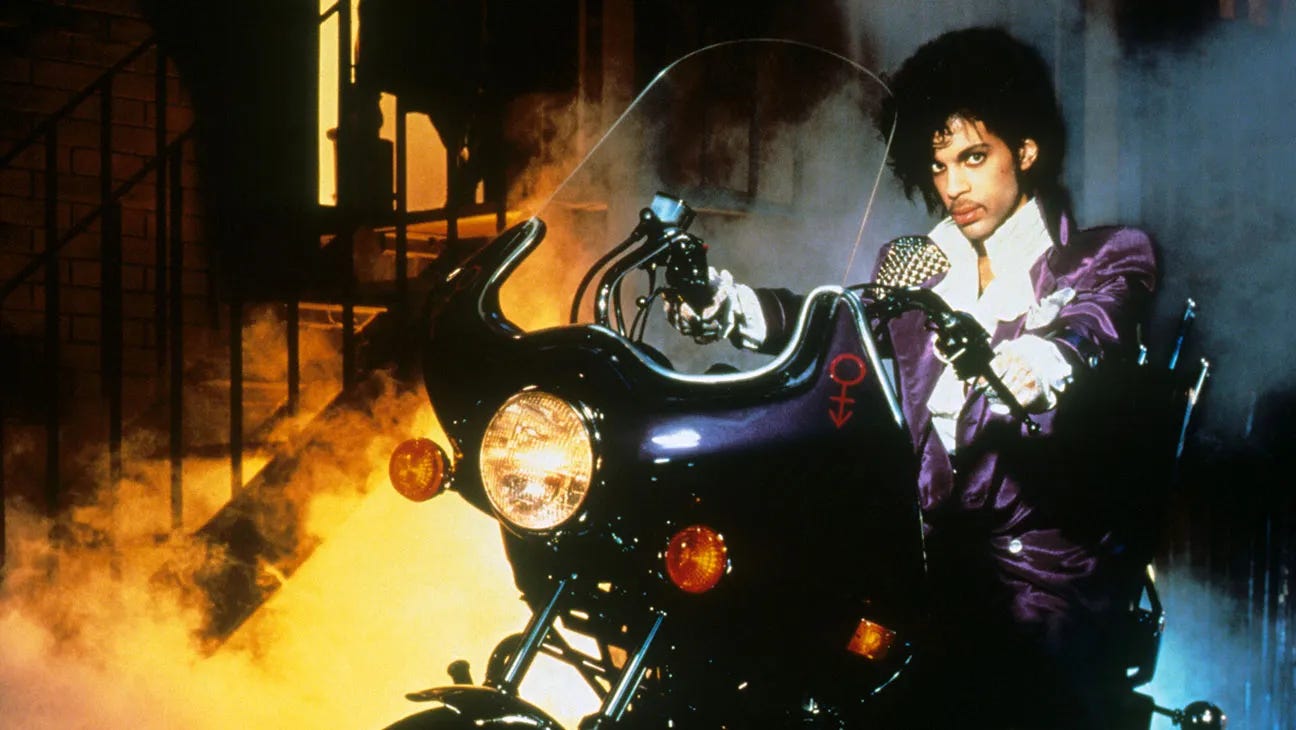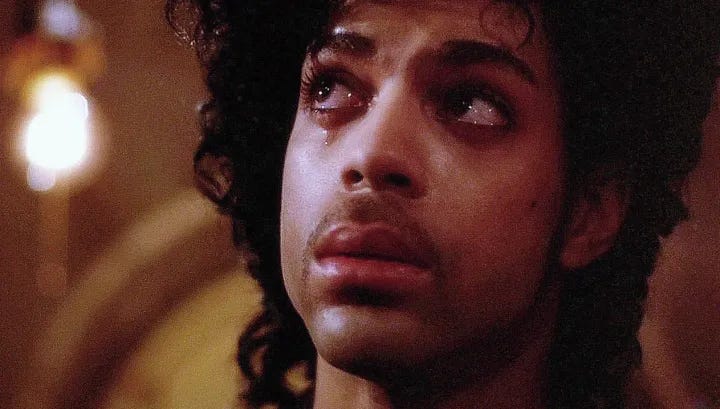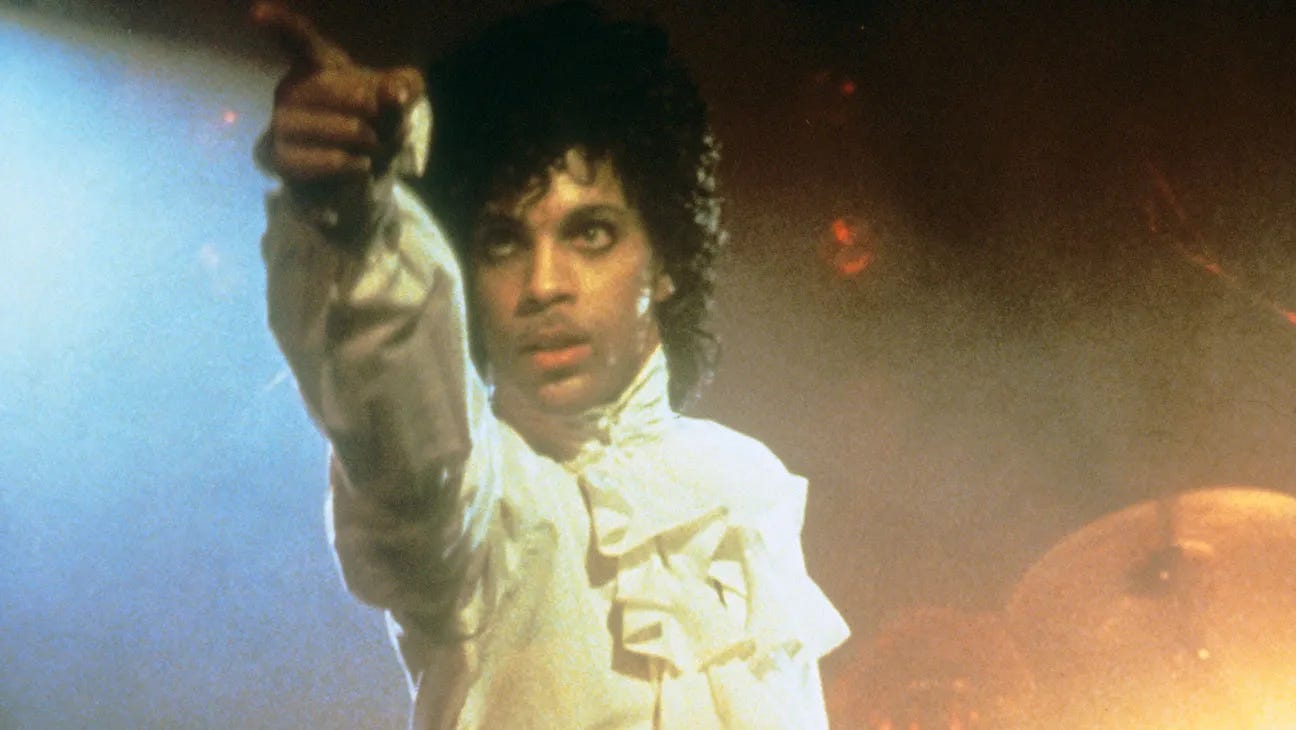Review: Prince's "Purple Rain" Shines Brighter Than Ever at 40
Our first "Movie of the Week" column kicks off with a musical classic
Welcome to Movie of the Week, a Wednesday column where we take a look back at a classic, obscure, or otherwise interesting movie each and every week for paid subscribers. Follow this link for more details on everything you get subscribing to Fade to Lack!
Purple Rain, the first film starring Prince, the soundtrack album of which is one of the most celebrated and highest-selling records of all time, turns 40 this week, originally releasing to American theaters on July 27th, 1984. To mark the occasion, Warner Bros. recently issued a new 4K Blu-ray of the film, and I took the opportunity to finally avail myself of a movie I’d long been interested in, but never seen for myself. Prince was an artist I’d long respected from afar, enjoying individual songs and some of his more popular albums (like Purple Rain), without doing a deep-dive on his discography. Seeing the film Purple Rain for the first time coincided with a major Prince kick I’ve been on lately; when I drove out from Iowa to Colorado earlier this month, I started listening to his 80s discography in order, and after mainlining Dirty Mind, Controversy, 1999, and Purple Rain all in one go, I knew I had a new obsession, one that certainly hasn’t abated since.
Oh, and the movie is one of my new all-time favorites. Just as it did on the album, Purple Rain the movie completely blew me away.
I expected electrifying concert footage and excellent use of the songs, but what I didn’t see coming was the sheer amount of truly potent filmmaking going on in, around, and through all that great music. Purple Rain is a film that juxtaposes Prince’s overwhelming musical genius with a character, The Kid, who is petty, small, insecure, and oftentimes ugly in his behavior. And instead of taking the typical musical biopic route and telling us, implicitly or explicitly, that all the bad behavior is the necessary cost of such genius, it traces an arc that tells us all the genius in the world isn’t worth shit if you can’t be a functional human being. Purple Rain isn’t technically a biopic – it takes inspiration from Prince’s life, but is obviously fictionalized and heightened in all sorts of ways – but its rejection of the logic that has fueled the subsequent 40 years of Hollywood music biopics, the ones I grew up watching and that continue to plague us now, is breathtakingly direct.
This is a film about generational cycles of abuse, about learned behavior and the way we inherit both the best and worst of our parents; how abuse is a pattern that gets passed down, a default we fall back into when it’s all we’ve ever known. The Kid both hates his Father and imitates him, is disgusted by his Father’s behavior and unable to avoid his own reflection in his Father’s face. Even as he is terrified of his father, The Kid also tries on the man’s behavior when his emotions get out of control, because that’s what he knows.
There is a scene I recognize intensely, painfully even, where The Kid is in his basement listening to Wendy and Lisa’s demo (the song that will become “Purple Rain”) when he hears his parents start screaming at each other; he starts shaking with anxiety, and turns up the music, trying to drown it out. I’ve been there; it’s so real it hurts. The flipside of that scene is when Apollonia comes over a few minutes later and a loving, romantic moment turns to violence on a dime, when she says she’s going to work with Morris and The Kid almost instinctually strikes her across the face out of jealousy. It’s all two sides of the same coin, the kid shaking with fear trying to drown out the anger upstairs, and The Kid imitating it when he reaches the limits of his ability to understand his own feelings. The film is adroit at recognizing and diagnosing that behavior without ever excusing it, or making the viewer feel like what he does to Apollonia in any way excusable.
Later in the film, The Kid comes home and sees that his dad has clearly done something awful to his mom, so he rages into the house calling the man out, ready for a confrontation. Instead of walking into violence, he hears a lovely, evocative piano melody playing downstairs, and goes to investigate. The camera cues in on his Father’s hands, shaking and unsteady above the keys; we cut back to the Kid with a pregnant look in his eyes. It says so much. Here are hands capable of stunning musical grace, used instead to hit a woman he claims to love. The Kid sees himself in that, and he sees a dark portent of his own future – that whatever genius or talent he has, that function of his hands won’t matter if he’s also using them for violence and jealousy. He'll just be another sad old man alone in his basement, unable to contain or control his emotions or channel them into anything beautiful, no matter how much brilliance is inside him. And so he tries having an honest conversation with his dad, not because the man deserves it, but because The Kid is in no position to judge – just to talk, and listen, and try to heal and try to be better.
This is tough, heavy material the movie is dealing with – not the kind of thing you usually see in a Hollywood studio picture, much less one meant to be a star vehicle for a giant pop culture icon. Purple Rain isn’t glossy self-promotion or insular brand building. It’s lacerating. I could certainly understand a critique that the film is a little too caught up in The Kid’s perspective to really account for or understand how the women in his life feel, especially when violence is done to them. But there is also something arresting and honest at taking a cold hard look at these kind of male insecurities, this study in what we would now call toxic masculinity, within the framework of a film audiences were probably expecting to be a glossy celebration of one of the hottest musicians of the day. It’s preemptively deconstructing the next few decades of awful music biopics and the kinds of tropes they’ll trade in, not to mention our society’s perpetual willingness to excuse the misdeeds of supposedly ‘Great’ men.
And it does all this while having the single greatest movie soundtrack of all time – the runners up would also be Prince albums (Parade, Batman, Graffiti Bridge), and some of the very best, most unforgettable imagery of the 1980s. Prince didn’t do half measures.
This is a gorgeous film, awash in deep, rich colors and lived-in environments pulsing with personality. There is great production design, between the stage at the First Avenue club and that incredibly evocative basement set where The Kid lives, and there is equally great location work showcasing the Minneapolis environs from which these characters emerge. Accepting a couple of the flaws in the source material (the scene where The Kid’s parents break into his room, fighting, has a few shots missing from the negative that were replaced with cuts from the workprint, but that was done way back in its original release), Warner’s new 4K disc is as good a restoration of a catalogue title as I've ever seen, particularly of the 1980s vintage. It is a must-own disc for anyone with a 4K TV, full of stunning filmic texture and jaw-dropping HDR enriching every color.
Of course, the construction of every musical scene is absurdly amazing. "The Beautiful Ones" may be the most arresting thing we get before the final concert, in just what a powerful piece of synesthesia it provides, Prince’s increasingly desperate vocals and his larger-than-life physical performance and the arresting capture of it all on film dovetailing in electric harmony. But every time a song kicks in, Purple Rain immediately feels like one of the best movies ever made.
Is the film a little awkward and stilted outside of that? Sometimes, yes. There is a sort of amateur 'theater kid' quality to some of the non-musical scenes that can lead to occasional awkwardness; not all the humor works (though I do find Morris Day extremely funny here, particularly in the ‘Who’s on First?’ style routine he gets into with Jerome), and as most of the people we see on screen are musicians first, most of the performances aren’t particularly 'polished.' But that same uninhibited energy also leads to the kind of raw, potent moments I talked about earlier, moments pulled right from the depths of the id that land, on me at least, with incredible power.
And it bears repeating that some of director Albert Magnoli’s filmmaking choices are truly extraordinary. I love how The Kid listens to the Purple Rain demo several times over the course of the movie, always in intense moments of vulnerability and self-reflection. In those scenes, the film is so good at subjectivity, at putting us in the mind of someone awash in confusion and self-loathing, who's putting so much work into erecting the shield around himself. When he listens to Wendy and Lisa’s tape, he can hear the brilliance. It resonates with him. And it makes him uncomfortable because there is a vulnerability in someone with this much anger and trauma setting aside his pride long enough to engage with it. He has to climb the mountain of his own ego and wrangle his insecurities to acknowledge and incorporate what his friends have made. Those scenes are beautiful, particularly the one after his Father attempts suicide, and The Kid tears the basement apart in response. After he discovers his Father’s sheet music, he takes a few pieces and walks off-screen, leading to the most extraordinary shot of the film: a long, slow, haunting traveling shot down the hallway and into the piano room, where the Kid keeps rewinding Wendy and Lisa’s tape as he looks at what his father wrote and tries out his own additions on piano. That moment is an astonishing, stupendous piece of filmmaking; I’ve seen the film twice now, and it took my breath away both times.
As ugly as The Kid is along the way, there’s absolutely no denying that Prince and company knew what they were doing here. Nothing is accidental. "Purple Rain," the defining song of Prince’s career and arguably the best song ever written for a movie, is presented here very explicitly not as the product of individual genius, but as a breakthrough that only comes when The Kid sets his ego aside, acknowledges the talents of the women in his band, and makes an attempt to do something healing and productive with his generational trauma and his Father’s failed art. That gesture says something profound, and underlines how truly committed this film is to its big ideas. I really struggle to imagine any 21st century musical biopic or musical star vehicle doing something quite like that, so fulsomely telling us that individuality can be a trap that limits genius, while embracing others and putting oneself in the context of one’s family and community can expand artistic horizons.
I love how Magnoli’s camera just holds on Prince for so much of the performance of "Purple Rain," from the start of the second verse for a few solid minutes, letting us study the emotions in his face as he puts everything into the song. Prince is not a polished, professional actor, as we see in other parts of the film, but he is one of the 20th century’s most extraordinary presences, and he brings it all to bear here. In this scene, he does some of the best screen acting I’ve ever witnessed. The movie ties every idea it has together here in the space between the music, the lyrics, and the face doing the singing, and it trusts the audience to get what’s going on. This isn’t just a love song – it’s a song about being broken, and realizing you’re broken, and saying sorry, and letting go. About healing. And of course, music can express that better than words ever could. When the big guitar solo comes in, it feels like The Kid has to do it, has to pour everything he’s got into those strings, because there is simply no other way to express it.
I adore the confidence of the filmmaking to give the entire last 20 minutes of the movie over to the concert, and let the music and the imagery tell the story. It feels significant that Apollonia isn't seen throughout the "Purple Rain" performance, even though the Kid is obviously thinking about her throughout. It lets us focus on the gesture, on the reconciliation going on within himself, instead of telling us the song or performance alone is the sum total of absolution and forgiveness. That’s not the point. The genius of the music doesn’t heal all wounds. Look at how “I Would Die 4 You” is juxtaposed with scenes of the Kid picking up the pieces of his life, visiting his dad in the hospital and sorting through the music scattered across his basement, letting Apollonia in to help him work through the detritus. It’s all of a piece. If he’s a shining star up there on the stage, it only matters because he’s doing the work to be a better, fuller person off the stage, too. It’s such a diametrically different message than most films about musical or artistic genius send. The genius isn’t the end point, or the thing that excuses bad behavior. It’s the thing you can only really bask in, really grasp and utilize, if you’re striving to be decent. Music is the place we go to rehearse and understand our humanity, so we can embrace it more wholly through the rest of our lives.
I love this movie.
NEXT WEEK: We continue our Prince journey with the next film he made after Purple Rain, and his feature directorial debut – 1986’s Under the Cherry Moon.
Read the book 200 Reviews by Jonathan R. Lack in Paperback or on Kindle
Like anime? Listen to the podcast I host with Sean Chapman, JAPANIMATION STATION, where we review all sorts of anime every week. Watch on YouTube or Subscribe wherever you get your podcasts.






